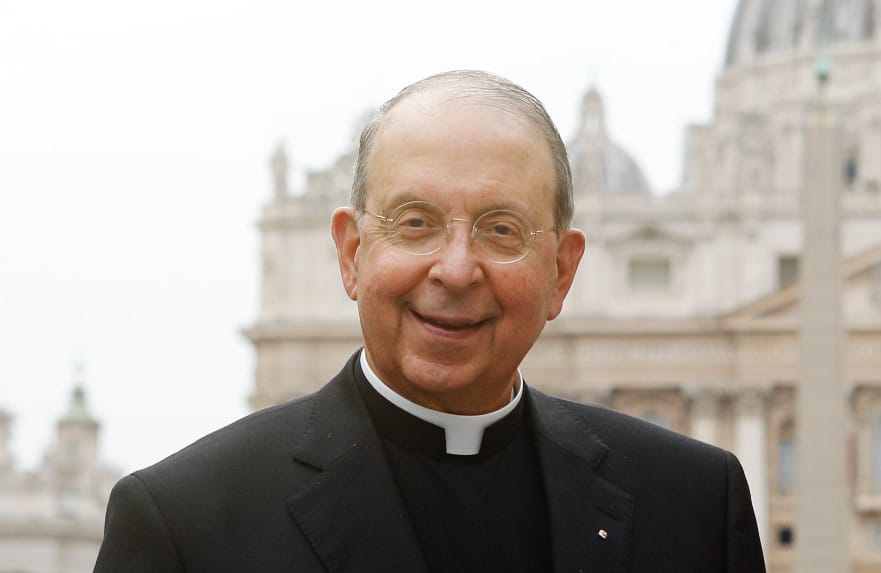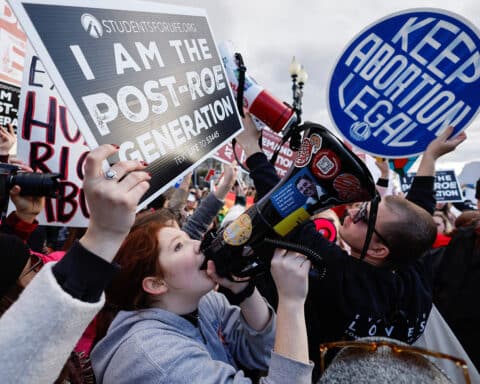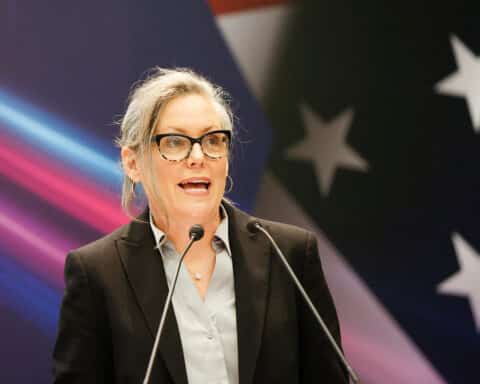The Supreme Court decision June 24 in the Mississippi abortion case Dobbs v. Jackson Women’s Health Organization that overturned Roe v. Wade set off a political and cultural earthquake in America that changes the landscape for how the Catholic Church and the pro-life movement advocates for pregnant mothers and their unborn children.
For nearly 50 years, pro-life supporters have been fighting to overturn the constitutional right to an abortion created by the court in 1973. The recent decision is being hailed as a landmark victory for the cause of life.
“The first thing for us is to redouble the effort to change minds and hearts,” said Archbishop William E. Lori of Baltimore, chairman of the U.S. Conference of Catholic Bishops’ Committee on Pro-Life Activities. Archbishop Lori participated in a joint interview with a team from the committee just hours after the Supreme Court’s decision was announced.
The decision in the Dobbs case ends the national right to abortion, and now it will be left up to state legislatures to determine whether abortion will be allowed and, if so, what types of regulations will be in place. The ruling was anticipated after a draft of the Dobbs opinion was leaked in early May, roiling the court itself and spawning its own investigation of the leak.
“We have to work on this from state to state,” Archbishop Lori said. “Some states are favorable to the ruling, and in some states that are not, a doubling-up of efforts is required. This will call for state marches, state legislative initiatives and fending off bills that are harmful to the sanctity of life.”
‘An opportunity to empower women’

Gloria Purvis, a Catholic speaker, podcast host and “whole-life” activist in Washington, D.C., participated in the interview. Purvis contended that the pro-choice complaint that banning abortion “is an injustice is the inverse” of the actual injustice in the matter, adding, “abortion is the injustice, just as the argument that abortion availability empowers women is actually the inverse of what it actually does.”
“The ruling is an opportunity to empower women,” Purvis said. She said that pro-abortion supporters who contend that the Dobbs decision “will harm poor Black women because they can’t afford to travel out of state to get an abortion as wealthy white women can” are missing the mark. “The measure of what white women can get and poor Black women can’t get is good food, education, health care and good policing. The separate measure for the rank and file average Black person is being able to get a job, to live in a safe community for them and their children and quality health care.”
Purvis is angered by the pro-choice arguments that the availability of abortion is a major need of poor Black women.
“They do not address the root causes of poverty when they say that, and I resent it that they put that on poor Black women,” she said. “Most Blacks do not support abortion, they don’t see that as a solution; they are not solving the problem by killing the poor.”
‘We need to do better’

Julie Dumalet, director of the Office of Pro-Life Activities for the Archdiocese of Galveston-Houston, said pro-abortion supporters peddle “the false idea that what is bad for the baby (abortion) is good for the woman.” Instead, through experiences in Project Rachel, she has heard women who have had abortions and men who supported abortion say they have been pained for years afterward with guilt.
“One man participating in Project Rachel after he supported the abortion of his child asked, ‘Is it normal to commit suicide after doing that?’ If [only] someone had been there to hold their hand when they were considering an abortion and help. … Abortion is deeply damaging to women and men, and, as the Catholic Church, we need to do better,” Dumalet said.
Archbishop Lori is hopeful that the bishops in the states where abortion will remain easily accessible can rally efforts like the current Walking with Moms in Need initiative that are serving as repositories of information for mothers who need help both during and after their pregnancies.
“As the chairman of the Pro-Life Committee, Walking with Moms in Need is one of our very highest priorities,” Archbishop Lori said. “We have gotten a great response from the bishops and, really, from the parishes.”
Archbishop Lori also pointed out that whether a state legalizes abortion services or does not, steps must be taken to support the mothers and children. He urges that the Child Tax Credit be strengthened in all states.
‘A countercultural moment’
With the long-sought victory in hand, Catholics and pro-life supporters have an “opportunity to re-envision” a more family oriented social compact, Dumalet said.
“For corporations, this is a chance to better structure the workplace: parental leave, at-work day care and the Child Tax Credit,” Dumalet said. “This is a chance to restructure our society to make it more family friendly.”

Elizabeth Kirk, director of the Center for Law & the Human Person, research associate and lecturer at Columbus School of Law at The Catholic University of America, said that “the ruling gives states greater latitude” to address abortion as “the majority of Americans don’t agree with it. … This is a time for a renewed conversation.”
Our Sunday Visitor asked Archbishop Lori if the ruling also presents an opportunity for the Catholic Church to be a countercultural institution.
“This is a countercultural moment to be sure. The Church has taken a prophetic stance on the sanctity of life. Prophetic stances ignite opposition, virulent opposition,” Archbishop Lori said. “Polling shows when people understand now that under Roe v. Wade there are few restrictions — right up to the birth of the child. A great many want some restrictions in place, especially in the later stages. It is not enough to be countercultural; the goal is to change the culture.”
Joseph R. LaPlante writes from Rhode Island.





